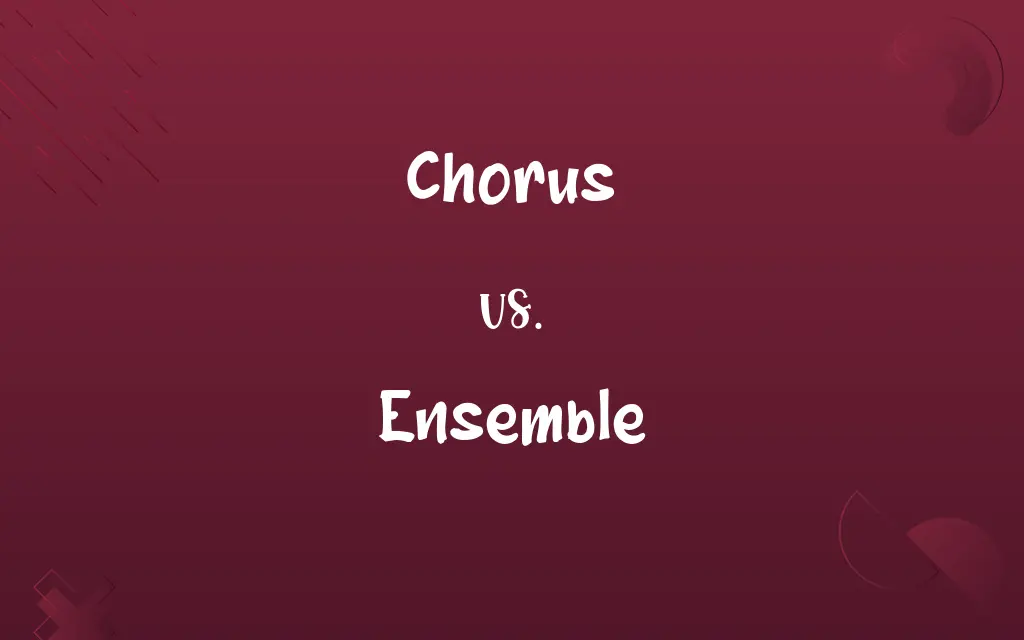Chorus vs. Ensemble: Know the Difference

By Shumaila Saeed & Dua Fatima || Updated on March 3, 2024
A chorus typically refers to a group of singers performing together, often in a musical or opera, while an ensemble can refer to any group of performers, including musicians, singers, or actors, collaborating in a performance.

Key Differences
The chorus is a musical term that specifically denotes a group of singers who perform together, usually providing background vocals or harmonizing in musical theatre, operas, and choirs. The ensemble, however, is a broader term that encompasses any collaborative group of performers, which can include instrumentalists, singers, dancers, or actors, working together in a performance.
Dua Fatima
Mar 03, 2024
A chorus often focuses on vocal harmony and unity, blending multiple voices to enhance the musical narrative or emotional impact of a piece. An ensemble emphasizes the collective contribution of its members, whether they are playing instruments, singing, or acting, to create a cohesive performance.
Shumaila Saeed
Mar 03, 2024
In classical music and opera, the chorus serves a specific role, often commenting on the action or providing a collective voice within the narrative. In contrast, an ensemble in theatre or music might involve a more varied interaction between members, with each potentially having distinct parts that contribute to the overall performance.
Shumaila Saeed
Mar 03, 2024
The training and rehearsal processes for a chorus might focus on vocal techniques, harmony, and blending of voices, while ensemble preparation can involve a broader range of skills, including instrumental proficiency, choreography, or dramatic interpretation, depending on the performance context.
Dua Fatima
Mar 03, 2024
While both choruses and ensembles require coordination and collaboration, the emphasis for a chorus is on achieving vocal harmony and a unified sound, whereas an ensemble might work towards a balanced and integrated performance that showcases the individual talents and contributions of its members.
Shumaila Saeed
Mar 03, 2024
ADVERTISEMENT
Comparison Chart
Definition
A group of singers performing together
A group of performers, which may include musicians, singers, actors, or dancers
Dua Fatima
Mar 03, 2024
Focus
Vocal harmony and unity
Collaborative performance across various disciplines
Shumaila Saeed
Mar 03, 2024
Typical Context
Musical theatre, operas, choirs
Orchestras, bands, theatre, dance
Shumaila Saeed
Mar 03, 2024
Role
Enhancing musical narrative or emotional impact
Creating a cohesive performance with diverse contributions
Dua Fatima
Mar 03, 2024
Training
Vocal techniques and harmony
Range of skills including instrumental, choreography, or acting
Shumaila Saeed
Mar 03, 2024
ADVERTISEMENT
Chorus and Ensemble Definitions
Chorus
A collective group of singers.
The opera's chorus filled the hall with a powerful harmony.
Shumaila Saeed
Mar 03, 2024
Ensemble
A collaborative group of performers.
The jazz ensemble impressed with their cohesive sound.
Dua Fatima
Mar 03, 2024
Chorus
Focuses on harmonizing and blending voices.
The chorus practiced to ensure their voices blended seamlessly.
Dua Fatima
Mar 03, 2024
Ensemble
Can be found in diverse performance contexts.
The chamber ensemble received acclaim for their interpretation of classical pieces.
Dua Fatima
Mar 03, 2024
Chorus
Integral to operas and musical theatre.
The musical's success was partly due to the captivating performance of the chorus.
Dua Fatima
Mar 03, 2024
ADVERTISEMENT
Ensemble
Focuses on showcasing individual talents within a group.
Each member of the ensemble had a moment to shine during the concert.
Shumaila Saeed
Mar 03, 2024
Chorus
Practices vocal unity and coordination.
The choir director emphasized the importance of unity in the chorus's performance.
Hifza Nasir
Mar 03, 2024
Ensemble
Works towards integrated performances.
The ensemble rehearsed to ensure every element of the performance was synchronized.
Shumaila Saeed
Mar 03, 2024
Chorus
Enhances the narrative in musical settings.
The chorus commented on the story's unfolding drama through song.
Shumaila Saeed
Mar 03, 2024
Ensemble
Includes various types of performers.
The ensemble featured actors, dancers, and musicians.
Shumaila Saeed
Mar 03, 2024
Chorus
A group of singers who perform together, usually singing multi-part compositions with more than one singer for each part.
Shumaila Saeed
Oct 19, 2023
Ensemble
A group of musicians, singers, dancers, or actors who perform together
An improvisational theater ensemble.
A woodwind ensemble.
Shumaila Saeed
Oct 19, 2023
Chorus
A musical composition usually in four or more parts written for a large number of singers.
Shumaila Saeed
Oct 19, 2023
Ensemble
A group of separate things that contribute to a coordinated whole.
Shumaila Saeed
Oct 19, 2023
Chorus
A refrain in a song, especially one in which the soloist is joined by other performers or audience members.
Shumaila Saeed
Oct 19, 2023
Ensemble
A group of musicians playing or singing together;
A string ensemble
Shumaila Saeed
Oct 19, 2023
Chorus
A group of persons who speak or sing in unison a given part or composition in drama or poetry recitation.
Shumaila Saeed
Oct 19, 2023
Chorus
A group in a classical Greek drama whose songs and dances present an exposition of or, in later tradition, a disengaged commentary on the action.
Shumaila Saeed
Oct 19, 2023
Repeatedly Asked Queries
What skills are important for ensemble members?
Skills vary depending on the performance type but generally include proficiency in their specific discipline (instrumental, vocal, dance, acting), as well as the ability to collaborate and integrate their performance with others.
Dua Fatima
Mar 03, 2024
Is an ensemble always musical?
Not always; ensembles can be purely instrumental, a mix of singers and instrumentalists, or even non-musical, such as a dance troupe or a group of actors in a play.
Shumaila Saeed
Mar 03, 2024
How do you become part of a chorus or an ensemble?
Joining either typically involves auditions where individuals showcase their abilities in singing, playing an instrument, or other performance skills relevant to the group's focus.
Shumaila Saeed
Mar 03, 2024
Can an ensemble consist of only singers?
Yes, an ensemble can consist solely of singers, especially in genres like barbershop or a cappella, where vocalists perform in harmony without instrumental accompaniment.
Hifza Nasir
Mar 03, 2024
Can a chorus be part of an ensemble?
Yes, a chorus can be part of a larger ensemble that includes instrumentalists and other performers.
Shumaila Saeed
Mar 03, 2024
What is the main difference between a chorus and an ensemble?
The main difference lies in their composition and focus: a chorus specifically refers to a group of singers, while an ensemble includes a variety of performers working collaboratively.
Dua Fatima
Mar 03, 2024
How does the role of a chorus differ in an opera versus a musical?
In an opera, a chorus often provides commentary and supports the narrative, while in a musical, it may also engage in choreographed movements and interact more directly with the main characters.
Shumaila Saeed
Mar 03, 2024
Do choruses and ensembles perform separately?
They can perform both as standalone groups or as part of larger works that involve other elements, such as orchestras, bands, or theatre productions.
Shumaila Saeed
Mar 03, 2024
What is a chorus in music?
A chorus is a group of singers performing together, typically involving a large number of people who harmonize and sing as one unit, often found in operas, musicals, and choral works. e.g., The chorus sang the anthem with powerful harmonies.
Dua Fatima
Mar 03, 2024
Share this page
Link for your blog / website
HTML
Link to share via messenger
About Author
Written by
Shumaila SaeedShumaila Saeed, an expert content creator with 6 years of experience, specializes in distilling complex topics into easily digestible comparisons, shining a light on the nuances that both inform and educate readers with clarity and accuracy.
Co-written by
Dua Fatima








































































